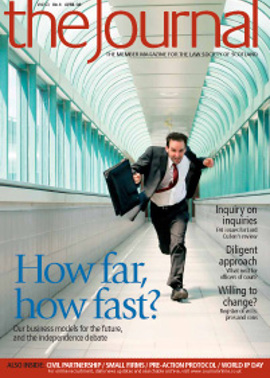Day of creation

In my role at Standard Life, Edinburgh, I manage the Standard Life Group intellectual property portfolio in the UK, with help from my colleagues in Edinburgh, and liaise with my counterparts in our Montreal and Frankfurt offices regarding their local IP portfolios. I am also a very keen supporter of World IP Day, and a member of the IP Committee of the Law Society of Scotland.
Why focus on WIPD?
I see World IP Day as an annual opportunity to help raise the profile of intellectual property within the legal and other IP-related professions, and inform, educate and perhaps even entertain some of our colleagues, internal and external customers and our day-to-day IP contacts. It can also highlight an IP policy, or the need for one. To paraphrase the quote from the film Field of Dreams, “If we build it, they will come”, and each year the World IP Day wave seems to be building on a worldwide scale with more events arranged and countries involved.
WIPD background
The World Intellectual Property Organization (WIPO) is a United Nations agency dedicated to developing a balanced and accessible international IP system. This aims to reward creativity, stimulate innovation, contribute to economic development and safeguard the public interest.
WIPO is based in Geneva, Switzerland and was established by the 1967 WIPO Convention. It has a mandate to promote the protection of worldwide IP through cooperation among states and collaboration with other international organisations.
In 2000 WIPO, in order to make IP more relevant to everyday life, designated an annual World Intellectual Property Day to be held on 26 April, as that date was when the WIPO Convention first came into force.
Although 26 April 2008 is a Saturday, WIPO suggests that member states celebrate the event during the week beginning 21 April, and many businesses will arrange events on Friday 25 April, as the nearest business day.2008 themes
This year WIPO will focus on celebrating innovation and promoting respect for IP. World IP Day images have been made available online, as well as a 2008 message from the Director General, Kamil Idris – www.wipo.int/ip-outreach/en/ipday/. The World IP Day activities planned are detailed at www.wipo.int/ip-outreach/en/ipday/2008/activities.html .
There will be several events in Edinburgh during the week beginning 21 April. I am chairing the Friday 25 April lunchtime World IP Day conference, organised by the In-house Lawyers Group of the Law Society of Scotland and the Faculty of Advocates: “Why Scotland should value its innovation and respect its IP”. Speakers are Roisin Higgins, advocate and IP specialist, and Magnus Cormack, senior legal adviser, Scotch Whisky Association. No free samples, but more details are available on the Society’s website at www.lawscot.org.uk/update .
There is more work to be done to communicate more about World IP Day, and WIPO must share the lead in this, perhaps with feedback and focus groups in each country, discussion forums, review of their annual timetables for notification of annual themes and artwork, distribution lists and communication channels used etc.
Back to the future
From Tudor times the UK was the original cradle of IP, with letters patent, Crown patronage and royal monopolies granted to courtiers to develop inventions. Scotland has its own unique history of innovation and IP protection and respect.
If we look at the countries and events declared each year on the WIPO site to date, the most developed nations have tended to lag behind and it is the emerging economies that seem most willing to embrace the WIPD idea and message. This is changing as more countries recognise the need to get back to IP basics and recover their grassroots support. With more WIPO steer and further support from government departments and other commercial organisations involved with IP, the UK could recover its place in the IP hall of fame and become a very cool and “IP hip” Britannia.
The UK Intellectual Property Office is a committed World IP Day supporter and has detailed some interesting WIPD 2008 events on its website and the WIPO activities page. It has been organising IP awareness seminars around the UK for some time, and these are a great way of hearing more about IP in practice from IP specialists, advisers and business entrepreneurs. They also provide great networking opportunities.
IP issues today
IP is now big business on a global scale and can add considerable value to transactions and balance sheets. We all accept that it is best business practice to protect and respect our own IP, and respect the IP of others, if only to maximise our IP assets and minimise disputes.
The Gowers Review, which was published at the end of 2006, helped raise the profile of intellectual property and focus on some of the ongoing IP issues within the UK. One of its first recommendations to be implemented was the change of name of the UK Patent Office to the UK Intellectual Property Office, which set the right tone.
Baroness Morgan, the recently appointed Minister of Intellectual Property, visited the IPO in Newport in February 2008, and rightly praised its drive and professionalism.
We are living in interesting times for IP in the UK, with government consultations on trade mark rules and changes to copyright exceptions, the patent prosecution highway being extended to cover international applications, enhanced UK patent e-filing, the appeal of the recent High Court decision against the UK IPO’s rejection of a software-related patent application, and pan-European patent costs being set to plummet in May.
Anyone for ADR?
Having experienced some of the delays and frustrations involved in trade mark oppositions and disputes in several countries around the world, I believe we have to rethink our approach to IP disputes. Just as Lord Woolf’s 1986 report, Access to Justice, tried to push parties towards legal action only as a last resort, I think we need to adopt a similar approach for trade mark disputes.
Alternative dispute resolution or a mediatory type approach can be a very useful tool which often facilitates resolution of some of the more straightforward IP issues, such as domain name and copyright disputes. This needs to be used more for trade mark disputes, and can only speed up the process and cut down on costs.
The UK IPO offers very useful dispute resolution options, including ADR and mediation. ADR has to be on any trade mark agenda as soon as there is any form of dispute, rather than as a last minute option when defeat or deadlines loom.
Michael Leathes had the right idea, whilst head of intellectual property at British American Tobacco, in driving the use of internal ADR training at all levels and adoption of ADR into day-to-day business.
Patents
Whilst I have only cut my teeth on patents within the last few years, I still think we should try harder for pan-European patents which harmonise more closely with pan-European trade marks. The certainty that would bring to the enhanced process, and the potential cost and time savings, would make this well worthwhile.
Happy World IP Day, when it comes!
Graeme McWilliams is Legal Adviser, IP & E-Commerce, at Standard Life, Edinburgh. The opinions expressed are personal views which do not reflect the views of Standard Life Group.
In this issue
- Thinking ahead
- A line too often crossed
- Big leap forward
- Independence: still viable?
- FAIs: a new lease of life
- ARTL: Turquoise is in the pink
- Summary trials: deciding the facts
- Life at the sharp end
- Conscience and public service
- Wills and ways
- Achieving "senior" rates?
- CPD: the way forward
- Life on the edge
- Pre-action protocol for industrial disease claims
- Fit a doin'?
- Same difference
- Curiosity corner
- System? What system?
- Reviewing appeals
- Testing insolvency
- Scottish Solicitors' Discipline Tribunal
- Website reviews
- Book reviews
- Day of creation
- Lawyer behind the camera
- Homing in on home reports






